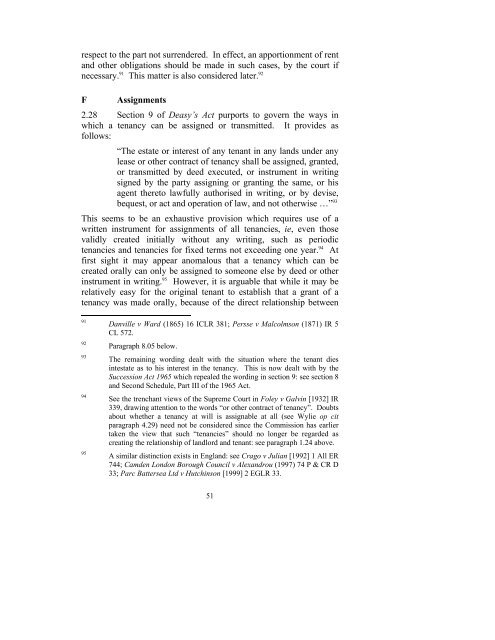Consultation Paper on the General Law of the Landlord and Tenant
Consultation Paper on the General Law of the Landlord and Tenant
Consultation Paper on the General Law of the Landlord and Tenant
Create successful ePaper yourself
Turn your PDF publications into a flip-book with our unique Google optimized e-Paper software.
espect to <strong>the</strong> part not surrendered. In effect, an apporti<strong>on</strong>ment <strong>of</strong> rent<strong>and</strong> o<strong>the</strong>r obligati<strong>on</strong>s should be made in such cases, by <strong>the</strong> court ifnecessary. 91 This matter is also c<strong>on</strong>sidered later. 92F Assignments2.28 Secti<strong>on</strong> 9 <strong>of</strong> Deasy’s Act purports to govern <strong>the</strong> ways inwhich a tenancy can be assigned or transmitted. It provides asfollows:“The estate or interest <strong>of</strong> any tenant in any l<strong>and</strong>s under anylease or o<strong>the</strong>r c<strong>on</strong>tract <strong>of</strong> tenancy shall be assigned, granted,or transmitted by deed executed, or instrument in writingsigned by <strong>the</strong> party assigning or granting <strong>the</strong> same, or hisagent <strong>the</strong>reto lawfully authorised in writing, or by devise,bequest, or act <strong>and</strong> operati<strong>on</strong> <strong>of</strong> law, <strong>and</strong> not o<strong>the</strong>rwise …” 93This seems to be an exhaustive provisi<strong>on</strong> which requires use <strong>of</strong> awritten instrument for assignments <strong>of</strong> all tenancies, ie, even thosevalidly created initially without any writing, such as periodictenancies <strong>and</strong> tenancies for fixed terms not exceeding <strong>on</strong>e year. 94 Atfirst sight it may appear anomalous that a tenancy which can becreated orally can <strong>on</strong>ly be assigned to some<strong>on</strong>e else by deed or o<strong>the</strong>rinstrument in writing. 95 However, it is arguable that while it may berelatively easy for <strong>the</strong> original tenant to establish that a grant <strong>of</strong> atenancy was made orally, because <strong>of</strong> <strong>the</strong> direct relati<strong>on</strong>ship between9192939495Danville v Ward (1865) 16 ICLR 381; Persse v Malcolms<strong>on</strong> (1871) IR 5CL 572.Paragraph 8.05 below.The remaining wording dealt with <strong>the</strong> situati<strong>on</strong> where <strong>the</strong> tenant diesintestate as to his interest in <strong>the</strong> tenancy. This is now dealt with by <strong>the</strong>Successi<strong>on</strong> Act 1965 which repealed <strong>the</strong> wording in secti<strong>on</strong> 9: see secti<strong>on</strong> 8<strong>and</strong> Sec<strong>on</strong>d Schedule, Part III <strong>of</strong> <strong>the</strong> 1965 Act.See <strong>the</strong> trenchant views <strong>of</strong> <strong>the</strong> Supreme Court in Foley v Galvin [1932] IR339, drawing attenti<strong>on</strong> to <strong>the</strong> words “or o<strong>the</strong>r c<strong>on</strong>tract <strong>of</strong> tenancy”. Doubtsabout whe<strong>the</strong>r a tenancy at will is assignable at all (see Wylie op citparagraph 4.29) need not be c<strong>on</strong>sidered since <strong>the</strong> Commissi<strong>on</strong> has earliertaken <strong>the</strong> view that such “tenancies” should no l<strong>on</strong>ger be regarded ascreating <strong>the</strong> relati<strong>on</strong>ship <strong>of</strong> l<strong>and</strong>lord <strong>and</strong> tenant: see paragraph 1.24 above.A similar distincti<strong>on</strong> exists in Engl<strong>and</strong>: see Crago v Julian [1992] 1 All ER744; Camden L<strong>on</strong>d<strong>on</strong> Borough Council v Alex<strong>and</strong>rou (1997) 74 P & CR D33; Parc Battersea Ltd v Hutchins<strong>on</strong> [1999] 2 EGLR 33.51
















